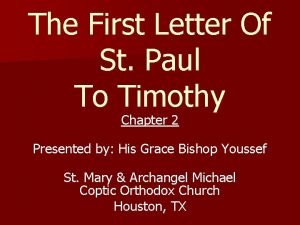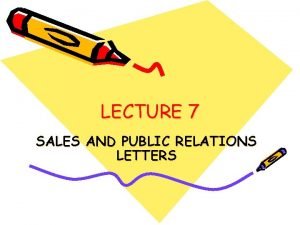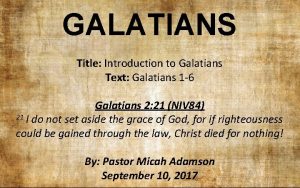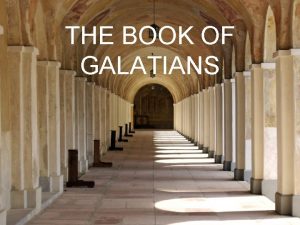The Letter Of St Paul To The Galatians

















- Slides: 17

The Letter Of St. Paul To The Galatians

Introduction Authorship • St. Paul (Gal 1: 1, 5: 2). Recipient • Two views whether to the churches of Galatia located in the north central part of Asia Minor (ethnic Galatia), or to the churches in the south central part (the Roman province of Galatia). Date and Place of Writing • North Galatia Theory: St. Paul had not been there until the beginning of his third missionary journey (54 -55 A. D. ).

Introduction • So he wrote his epistle sometime toward the end of that journey, or afterward (i. e. , around 57 -58 A. D. or later). • South Galatia Theory: The churches of Galatia are established on St. Paul's first journey. • So based on this theory, the place could be: – Corinth, in the period of Acts 18: 1 -17 – Antioch, in the period of Acts 18: 22 – Ephesus, in the period covered by Acts 19: 1 -41 – Macedonia or Achaia in the period of Acts 20: 1 -3

Introduction • Ephesus around 55 A. D. is the most accepted because of his long stay there. Purpose • To verify his apostleship • To respond to the Judaizers Chapter 1 Outline • Salutation 1: 1 -5 • Reason for his letter 1: 6 -10 • The divine origin of his apostleship 1: 11 -17 • His relationship with other apostles 1: 18 -24

Salutation (1: 1 -5) • His apostleship is divine and not human, so his words are true. • Although the church baptized St. Paul, and laid the hands on him, but his calling, as every other calling is from God. • The Holy Trinity who has the same will called St. Paul. • Through the resurrection of Christ we became justified by His grace and not through the works of the Law. • All the brethren (who are one in faith with me).

Salutation (1: 1 -5) • His heart was not happy with them (no words of praise) because of their deviation from the true doctrine. • Grace is needed to protect them from drifting away. • Peace is needed because of the confusion and distraction of the false teachers. • Who has the grace of God will have the peace of God too. • It is the will of the Father and the action of the Son.

Salutation (1: 1 -5) • We received the grace and the peace because our sins are forgiven through His cross and not through the works of the law. • This grace is also needed to deliver us, according to God’s will, from this present evil age and all its temptations (1 Tim 2: 4). • We received also the gift of sonship through His grace and not the works of the law. • St. Paul is praising the Lord for His grace.

Reasons For His Letter (1: 6 -10) • Turning away from the gospel and the true doctrines is turning away from God Himself. • God called us to enjoy the grace that we received in Christ. • Different gospel means different doctrine. • Another gospel, means same doctrine but another writer (Matthew, Mark…etc). • Preaching false doctrines is perverting the gospel of Christ and troubling the believers.

Reasons For His Letter (1: 6 -10) • That is why preaching false doctrines is a major sin and the person who does it will be accursed from God. • St. Paul included himself in this excommunication to indicate that what it really matters is not the person who preach but the content of the preaching. • The repetition in verse 9 is to indicate the seriousness of the issue at hand. • Many times the truth irritates others but we should not compromise the truth to please people. • If St. Paul wanted to please people, he would not be a Christian and a bondservant of Christ.

The Divine Calling (1: 11 -17) • St. Paul is verifying the divine origin of his apostleship. • His gospel is we are saved by the grace of God and not by the works of the law. • He received this teaching directly from God Himself and not from man. • Before the grace of God working in him, he was a persecutor of the church. • His goal was to destroy the church. • He was a zealous Jewish, but how come Judaism which is a heavenly faith made him so violent?

The Divine Calling (1: 11 -17) • It is not Judaism but the wrong practice of faith (the Lord Jesus was a Jewish too). • He was violent because of: – The human traditions which made him proud and paying attention more to the letter than to the spirit vs. the Divine Tradition – The blind prejudice and the zeal which is not according to knowledge (Rom 10: 2). • Pharisee means “separated”, so he was separated first for the works of the law and now for the gospel of salvation.

The Divine Calling (1: 11 -17) • This separation and calling is not according to works of the law but according to the grace of God since he was called from his mother’s womb (Jeremiah 1: 5) • It is God’s pleasure to call us all to salvation. • God has a plan and purpose for each one of us (Eph 2: 10). • The Lord lived and was revealed in St. Paul, so he was not speaking about God but preaching Christ who lived in him. • God’s purpose in St. Paul’s life is to preach the gentiles. • To fulfill God’s calling he did not consult with any human beings including himself (vs. Jonah).

The Divine Calling (1: 11 -17) • After the revelation on the road to Damascus, he was puzzled and tried to reflect on his life, so he went to Arabia (Acts 9: 23) then he returned back to Damascus. • Arabia is most probably mount Sinai (Gal 4: 25) • The importance of retreat and reflection before starting the ministry. • He did not go to the apostles: This is not pride but he is emphasizing that his apostleship is from God not from men.

St. Paul and The Apostles (1: 18 -24) • Then after three years he went up to Jerusalem to see Peter (Acts 9: 25). • James, the bishop of Jerusalem (the Lord’s cousin or the son of Joseph). • St. Paul emphasizing before God that he is saying the truth. • Then he went to Syria and Cilicia (Acts 9: 30, 11: 25). • He did not mention anything about his second visit to Jerusalem (Acts 11: 30, 12: 25) because: – He was unknown by face to the churches of Judea – The purpose of this visit was only delivering the alms.

St. Paul and The Apostles (1: 18 -24) • One of the allegations against St. Paul was that he himself observed the law among the Jews, though he persuaded the Gentiles to renounce it, and that his motive was to keep his converts in a subordinate state, excluded from the full privileges of Christianity, which were enjoyed by the circumcised alone. • So, St. Paul is explaining that he was unknown to the Jews by face. They only heard about the work of Grace in him. • Faith in verse 23 means the gospel (not the act of believing).

St. Paul and The Apostles (1: 18 -24) • Having understood the entire change, and that the former persecutor is now acting the shepherd's part, they received occasion for joyful thanksgiving to God in respect to me. • How different, he implies to the Galatians, their spirit from yours! • The successful servant is the one who draws people’s praise toward God not himself • When we praise the servant, we may tempt him with vain glory but praising the Lord, protect the servant. • St. Paul is emphasizing that there was no enmity between him and the churches in Judea.

Conclusion • The greeting in verse 3 is typical of all of St. Paul's letters. Why does he always start by saying “grace and peace? ” • St. Paul is clearly angry at the Judaizers (v. 6 -9). Who were they and what were they doing? • What is wrong with trying to win the approval of men? • Why do you feel St. Paul told the Galatians they were deserting Christ? • What does St. Paul mean by a different gospel? • What made St. Paul violent? • How can others glorify God in us?
 St paul's letter to the galatians
St paul's letter to the galatians St paul's letter to the galatians
St paul's letter to the galatians Write sky grass and root letters
Write sky grass and root letters Letter to the galatians summary
Letter to the galatians summary Letter of st paul to the philippians
Letter of st paul to the philippians Letter of st paul to timothy
Letter of st paul to timothy Letter of st paul to the colossians
Letter of st paul to the colossians Letter of saint paul to the philippians
Letter of saint paul to the philippians Paul's letter to timothy on leadership
Paul's letter to timothy on leadership Book of romans summary
Book of romans summary Letter of st paul to the ephesians chapter 4
Letter of st paul to the ephesians chapter 4 Second letter of st paul to timothy
Second letter of st paul to timothy Discuss the nuances of sales letters.
Discuss the nuances of sales letters. Examples of a friendly letter
Examples of a friendly letter Letter writing process
Letter writing process Thank you name with comma
Thank you name with comma Placing an order letter format
Placing an order letter format Block by block writing style
Block by block writing style































